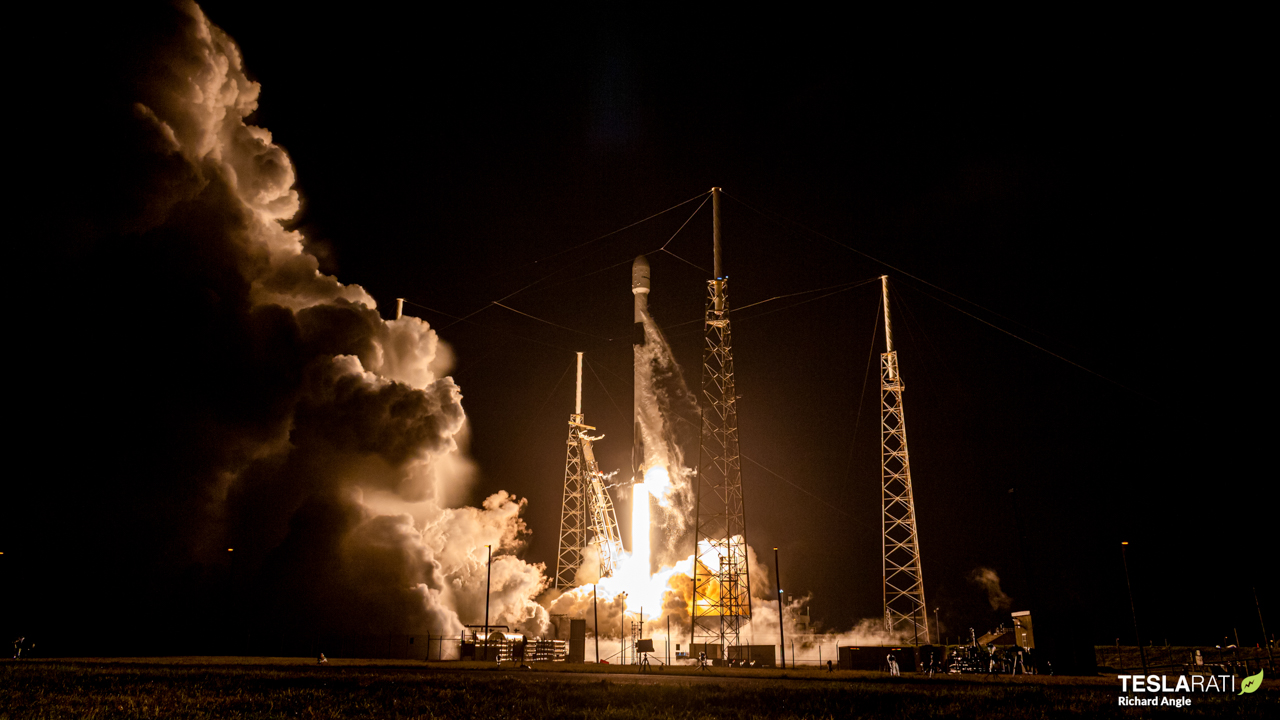Falcon 9 B1077 completed its 6th launch and landing, sending the Intelsat Galaxy-37/Horizons-4 satellites to geostationary transfer orbit.
Launching midway through the 2-hour launch window due to weather around Cape Canaveral Space Force Station, Booster 1077 lifted off from Space Launch Complex 40, heading due East away from Florida.
Liftoff! pic.twitter.com/GVP7zobtv3
— SpaceX (@SpaceX) August 3, 2023
Following the first stage portion of the flight, B1077 separated from the 2nd stage. Just before the entry burn, something not usually seen is lightning, but at roughly 80 km altitude, lightning was seen flashing in thunderstorms below over the Atlantic Ocean.
The droneship, ‘Just Read the Instructions,’ was clear of those storms, and the Falcon 9 made a smooth landing roughly eight-and-half-minutes after launch.
Falcon 9’s first stage has landed on the Just Read the Instructions droneship pic.twitter.com/miU7GVqx3q
— SpaceX (@SpaceX) August 3, 2023
The second stage completed its first burn just over eight minutes into the flight and proceeded to coast for another ~18 minutes before the second stage lit back up and performed its last burn over the Gulf of Guinea for just under 1 minute.
The second stage and payload then coasted for another five minutes before the G-37/H-4 payload was deployed. The satellite will now use its onboard thrusters to continue its journey to geostationary orbit.
The fairings that protected the satellite made a fiery re-entry through the atmosphere before a parachute assisted splashdown in the Atlantic Ocean and will be plucked out of the water by the recovery ship Bob.

Recovery ship Bob with fairings aboard (Credit Richard Angle) and a view of fairing re-entry (Credit SpaceX)
Coming up next for SpaceX is the Starlink Group 6-8 mission. This launch is currently scheduled for no earlier than August 6th.
Catch a replay of the Galaxy-37/Horizons-4 launch below!
Questions or comments? Shoot me an email at rangle@teslarati.com, or Tweet me @RDAnglePhoto.


buy stromectol for humans – tegretol 200mg without prescription buy tegretol 200mg
cost accutane 10mg – order generic zyvox linezolid order
amoxil buy online – buy generic amoxil online oral combivent 100mcg
azithromycin ca – tindamax 300mg ca bystolic 20mg oral
buy neurontin 600mg – itraconazole 100mg drug order itraconazole 100 mg pill
buy lasix medication – buy betamethasone cream3 buy betamethasone 20 gm without prescription
order augmentin 375mg pill – ketoconazole 200 mg generic buy duloxetine 40mg pill
augmentin 625mg drug – cymbalta 20mg cost buy cymbalta 20mg pills
order rybelsus pill – semaglutide 14mg over the counter cheap periactin
tizanidine 2mg pill – tizanidine generic buy generic microzide
order tadalafil 5mg online – female cialis sildenafil 100mg sale
order sildenafil 50mg pill – tadalafil online order tadalafil 40mg cheap
order cenforce 50mg – glucophage 1000mg ca buy glycomet 1000mg online cheap
buy omeprazole 10mg generic – metoprolol 100mg cheap tenormin 50mg cheap
order depo-medrol for sale – buy depo-medrol without prescription buy triamcinolone sale
cost desloratadine – buy clarinex generic order priligy 30mg without prescription
buy zovirax 400mg pills – order crestor sale rosuvastatin 20mg usa
buy domperidone online cheap – sumycin 250mg pill buy flexeril without prescription
order motilium 10mg for sale – cheap cyclobenzaprine 15mg order cyclobenzaprine 15mg online cheap
order inderal 10mg online – where can i buy methotrexate buy methotrexate cheap
order medex for sale – reglan 20mg generic how to get cozaar without a prescription
generic levofloxacin 250mg – order levofloxacin 500mg generic buy ranitidine 300mg pills
order esomeprazole online – buy topamax 100mg pills imitrex online order
how to get mobic without a prescription – mobic 15mg sale oral tamsulosin 0.4mg